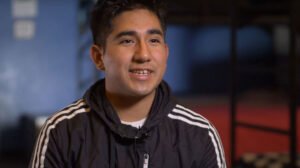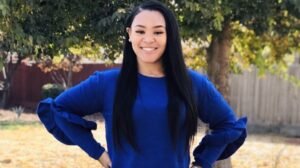Protect the Unhoused Testimonies
Meet Rica: High School Student

Tesimony from San Diego Youth Services
“[The shelter] was a new place for me and I thought it would be scary, but when I met a lot of staff and other service partners like me I felt like I was at home. I was connected to different counseling services and able to access some of my basic health needs, like dental care, medical care and vision. I even learned how to take the bus. Now my goal is to get into Job Corps, finish high school and eventually go to college.
The services provided were very helpful but at the end of the day I felt that I was the one who made it possible because I had the courage to pursue a better future for me. I taught myself how to be brave and realize that in life, all of us face challenges.
I want to encourage all of you that nothing is impossible. You need to believe in yourself. There are people out there who care and if you are given the opportunity, take advantage of it. There is a lack of safe housing options for teens in San Diego, but we have the chance to end youth homelessness. We can make it happen. I believe every youth is part of the future and deserves to have a stable place to be and finish their education, so they can achieve their goals in life.”
Meet Angel: High School Student

Testimony from San Diego Youth Services
“Homelessness means you have nowhere to go. Even if you have no friends to go to, if you have a family at the house that doesn’t want you, you have nowhere to go but the street. I was really stressed out. I wasn’t thinking properly in my head. I was self-harming, not knowing what I was doing. At that point, I knew I didn’t want to go too far so I called 911 and they came in and took me to the hospital to get evaluated.
My next step is finishing anything to do with school to give me skills to help me get a job, which will help me to live independently. What’s good about being [at the shelter] is you feel comfortable. You can connect with other youth and staff members also have their stories. You can talk to them and you just feel comfortable.”
Meet Djulia: Foster Youth

Testimony from San Diego Youth Services
“My parents are from Africa where parents don’t have money to send their children to school; children stay home to do chores. My parents came to the US for education. I don’t want to waste that opportunity.
“Being a person of color means I am not meant to thrive in a society designed to make me stay down. I’ll be proving society wrong by showing I’m capable of doing something better by going to college. I want a better future for myself, don’t want to live paycheck by paycheck, and want to go back to my home country to start a non-profit that will spread to all of Africa. It took a village to get me here; I want to give back.
“My high school aims to get low-income kids to college, and has many opportunities that every student should have. My best friend and I stay on top of each other in our studies. I chose UCB because I want to be in a law environment. I want to major in political science. UCB also has a squash team. Financial aid was good. Not looking forward to adulthood. Being by yourself is not easy but good; it’s a learning process.
“I want to look back on college knowing that I did not get a big head. I want to stay rooted to my purpose and where I am from. I want to finish school without shortcuts; knowing I stood on my own work.
“Many foster youth don’t know about resources out there and tend to reject those who help us. We have to allow people in to help us socially, emotionally and financially. We shouldn’t see ourselves as doomed. Don’t sell yourself too short. Don’t say, ‘Let me just screw around and get by.’ Foster kids come with advantages. Use the resources that are there. Be your own motivator. Find a way. Don’t just sit down. There is always more to everyone.”
Compared to criminalization and prioritization of temporary shelter, which do not solve houselessness, providing permanent housing is cost effective over the long-term, including through savings from reduced reliance on emergency services, lower court and jail costs, and reduced direct expenditures for sanitation, temporary shelter, and police interventions.
Meet Erika: Pregnant Teen

Testimony from San Diego Youth Services
Erika Anibogwu was just 15 when she found herself pregnant and alone. Being on her own as a teenage parent wasn’t a choice.
“My mother put me out,” Erika said. “It wasn’t a choice I wanted.”
At 17, she moved into one of our transitional housing apartments in Point Loma with her 18-month-old son. She started working, finished high school and ultimately moved into her own private apartment with our help.
Today, Erika owns a successful child-care business and is earning an associate degree. Now 27 and married, she reached out to share her story and inspire other youth.
“There’s a lot of things I want to do now,” Erika said. “I’m on the ball. People always said, ‘You’re going to be tested’ and it wasn’t important but I’m more established and grown now.
“As a teenager, you think all the rules are so foolish, but I’ve carried all the things I learned at SDYS with me. Keeping your house clean, budgeting, just how to be a successful adult. You learn yourself that it’s important and you can do it. You’ve just got to have patience and stay focused.”
In the last month, Erika received a license to further expand her childcare to 14. She also hired help.
Meet Ramon T: Employed Father
Ramon T. worked as a roofer. He, his wife, and two very young children had an apartment that was infested with roaches and barely habitable, and still they could not afford the $1,200 per month rent. The landlord evicted them. His family moved into his wife’s mother’s already crowded apartment, while Ramon set up his tent in MacArthur Park.
Meet Kate W: Mother and Domestic Abuse Survivor
Kate W. fled her abusive husband with her children. The domestic violence shelters would not let her stay because her children were too old, so she moved into a large encampment in a riverbed in Ventura County. She got a job and an apartment in Los Angeles, but the pay was not enough for her to cover rent. After her eviction, she continued to work while living in an encampment in the Van Nuys section of Los Angeles.
Read more from “You Have to Move”
